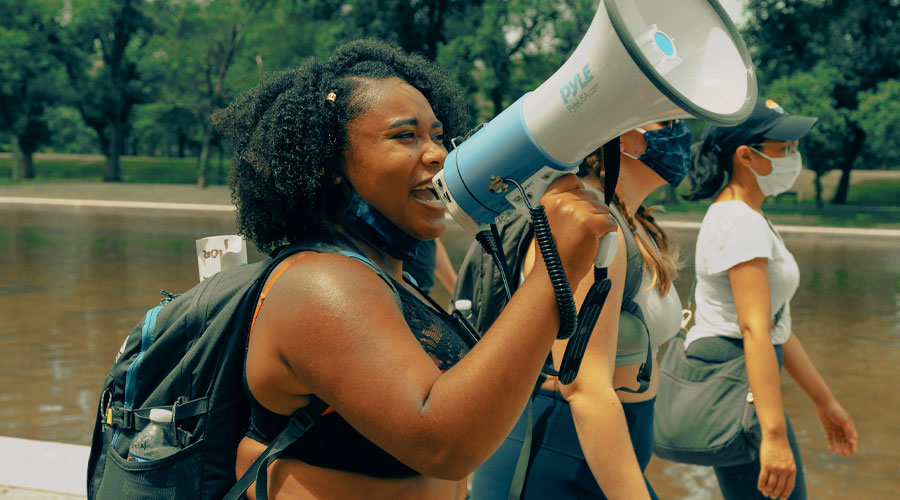While the modern civil rights movement began on December 1, 1955 with a courageous act of defiance by Rosa Parks and ended with the passage of the 1965 Civil Rights Act, the fight is not over for racial equality. Over six decades later African Americans still face alarming inequities across all sectors of society.
It begs the question – what has really changed? With significant racial barriers still in place and a majority of Black communities still concentrated in the poorest neighborhoods of the U.S., it is still a challenge for Black people to achieve their full potential.
Civil rights organizations in the current climate must be both local and global in their scope, and groups are rising up to accelerate change. Social justice organizations like Black Lives Matter have turned emotional responses to injustice into real-world outcomes. Organizations such as the REFORM Alliance and the United Justice Coalition recognize the enormous challenges to achieving true racial justice and promote a modern civil rights agenda for the Black community.
Out of Outrage, Comes Change
After the killing of Trayvon Martin in Florida in 2012, and the acquittal of his killer, a public outcry began on social media with #blacklivesmatter. As the country grieved and watched the news unfold, #blacklivesmatter gained a foothold in our modern lexicon as it took on a more holistic meaning. In 2020, the murder of George Floyd by police in Minnesota was captured on video, and its horror ignited social protests during a period of maximum uncertainty for our nation. The fire that was kindled in 2012 raged into a bright beacon for the world eight years later – and a global Black Lives Matter movement was born.
The original movement, ushered in by three Black women, Alicia Garza, Patrisse Cullors, and Opal Tometi, has become a watchword for racial inequality around the world. Focused on making positive impacts in communities to “build local power in response to violence” the BLM movement takes our immediate, raw, emotional responses to tragedy and focuses that energy to “intervene in violence inflicted on Black communities by the state and vigilantes.” They hope to not only revitalize communities that are suffering the collective impact of generations of directed indifference and harm, but also promote inclusivity, Black joy and to create space for Black imagination and innovation.
Black Lives Matter focuses on global awareness around modern slavery, continued marginalization of women and minorities, and the impact of misinformation. They’ve also reacted to recent local legislation that aims to quell public protests (such as BLM protests) in the name of “safety” but which are really racially-motivated free speech inhibitors.
To counter police-led reactions to issues in marginalized communities, they’ve supported federal legislation like the 2021 “People’s Response Act” which would create a new division within the Health and Human Services department in the federal government to respond to issues impacting public safety in America. The bill supports a greater focus on mental health, housing, healthcare and systemic issues affecting communities, such as inadequate investment in infrastructure and career development opportunities.
Reforming Systems Built Around Inequality
With a focus on changing our justice system and the inequities that keep a disproportionate number of Black Americans trapped within an infinite loop of prison, probation and parole, REFORM Alliance aims to make sweeping changes. Founded by a group of philanthropists and activists, including Robert F. Smith who serves as a Founding Partner, REFORM Alliance brings together policymakers and allies who can effect change at the local and state level, as well as advocating for change on a national level. To date they’ve helped pass proactive legislation in California, Florida, Michigan, Virginia, New York and many other states.
The United Justice Coalition (UJC) likewise aims to raise awareness around wrongful convictions and social injustices on the community and national level. Made up of like-minded activists and professionals as well as regular Americans whose family members have been killed by police, the UJC has helped amplify important issues like prison conditions and police misconduct. It also hopes that by bringing light to these problems, and offering connections between average Americans and organizations in their communities fighting for justice, it can energize voters in the upcoming midterm elections. The UJC recently held a summit to help amplify these talking points, and you can watch the entire event online.
Smith’s Efforts to Improve Black Communities
Robert F. Smith has dedicated his philanthropic focus towards improving underrepresented communities across the U.S., especially the southern communities with the highest concentration of the Black population. The Southern Communities Initiative partners corporations with local community groups already active in six regions home to more than half of the African American population. Their work aims to improve investment in these communities in ways that can create generational impacts that will widen access to critical infrastructure, close the digital divide, improve banking access and financial services and create educational equity.
He supports many different racial equity initiatives and has made positive change in the Black community with different events like Be Woke.Vote’s voter education and engagement efforts around the 2020 election. In partnership with World Central Kitchen, Smith has also supported focused community events such as NAN’s “Operation Feed Harlem,” which provided over 900,000 meals to Harlem area residents. Honored as a civil rights leader by NAN in 2018, Smith spoke at NAN’s 2018 Annual National Convention where he discussed his thoughts on the digital divide and creating a better future for Black generations.
Stay up to date with all of Smith’s current philanthropic initiatives, including the Southern Community Initiative among others.
